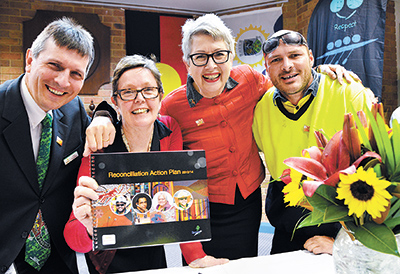Lismore City Council has launched the first local government Reconciliation Action Plan (RAP) in the Northern Rivers in a moving ceremony full of joy and tears.
The Council Chambers were packed with Aboriginal Elders, Aboriginal employees and their families, and other staff who came to see Council launch this concrete commitment to reconciliation.
General Manager Gary Murphy spoke of his experiences growing up in South Africa under apartheid and the injustices he had witnessed.
He said action on Aboriginal equality was close to his heart and the RAP would be acted on swiftly and with purpose.
“We have a lot of plans around here that sit on shelves – this one will definitely not do that. This is far, far too important.”
With a formal apology to the Stolen Generations in 2008 from the Federal Government the challenge now for all Australians, and in particular leaders, is to back up those words with action.
Aboriginal people around the nation recently celebrated NAIDOC Week and the 50th anniversary of the presentation of the Yirrkala Bark Petitions to the Australian Parliament protesting the granting of mining rights and seeking recognition of the Yolngu people’s ownership of the land.
The bark petitions were the first traditional documents recognised by the Australian Parliament and were a catalyst in advancing changes to the Constitution in the 1967 Referendum, the statutory acknowledgement of land rights by the Commonwealth in 1976 and the overturning of the concept of ‘terra nullius’ in the High Court during the 1992 Mabo case.
Now, the question of Aboriginal constitutional recognition is the latest in a long line of measures to try and right the wrongs of the past. Gary Murphy believes local councils can play a key role in advancing that recognition.
Endorsed by Reconciliation Australia, Lismore City Council’s RAP was developed through a methodical and inclusive process with Community Services staff consulting with Aboriginal stakeholders to establish a series of stepping stones leading to increased equality for Aboriginal people.
The RAP includes changes to Council’s Aboriginal Employment Strategy with a targeted increase in Aboriginal employment until 2017 to reflect the proportion of Lismore’s workforce that is Aboriginal.
Council’s Community Services Coordinator Annie McWilliam said Council would also deliver Aboriginal cultural awareness training for all staff; facilitate National Reconciliation Week and NAIDOC Week events in partnership with the Aboriginal Community; and develop a Supplier Diversity Policy to ensure Aboriginal businesses are considered in procurement processes.
“The RAP will ensure every Council employee is imparted with a knowledge and appreciation of Aboriginal culture. This understanding, combined with concrete practical actions like changing our Aboriginal Employment Strategy, is reconciliation that is not just symbolic but promotes long-lasting attitudinal, behavioural and institutional change.”

















